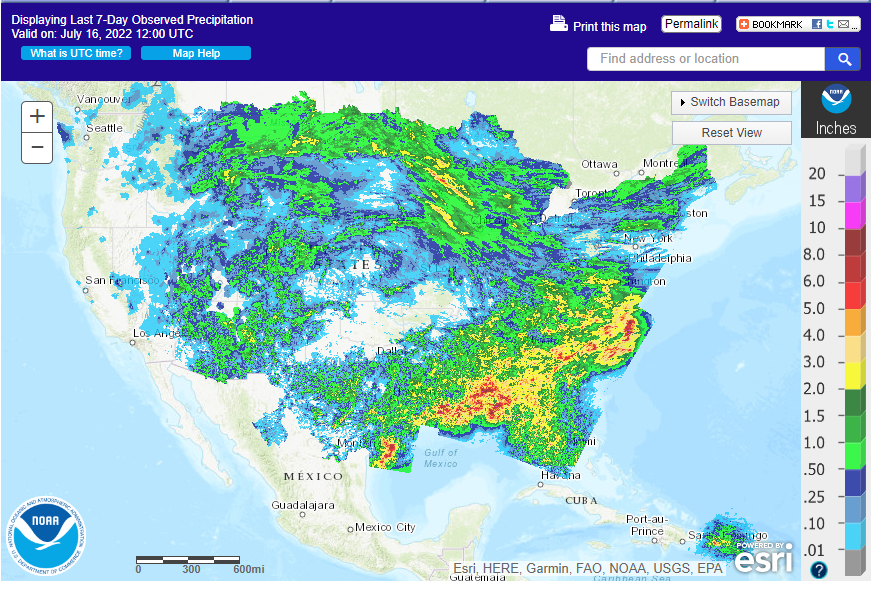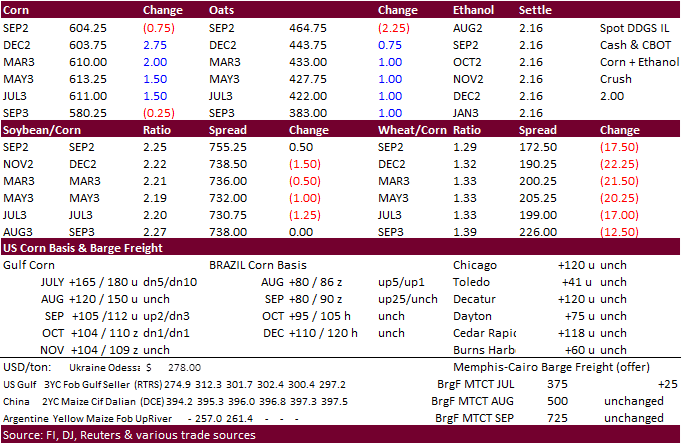PDF Attached
EXPORT
SALE RETRACTION (FAS-ESR-068-22)
The
daily export sale announced by FAS this morning is withdrawn based on updated information received from the exporter. FAS-ESR-068-22 had reported the sale of 133,000 metric tons of corn for delivery to China during the 2022/2023 marketing year.
https://www.fas.usda.gov/newsroom/export-sales-china-17
Oil
share rebounded with sharply higher soybean oil and lower meal. We think that was technical. Soybeans ended mixed with old crop on the defensive. US weather was mostly unchanged and there will be some rain for the Midwest for the week ending July 24th.
Corn was mostly higher, but gains were limited from lower Chicago wheat. The weakness in wheat reflected good rain over the past week for Canada and US spring areas, along with harvesting pressure in France.
Indonesia
on Saturday announced they will remove all palm export levies until August 31 and set the max palm oil export tax of $240/ton from September 1 when the reference price is above $1,500 per ton.
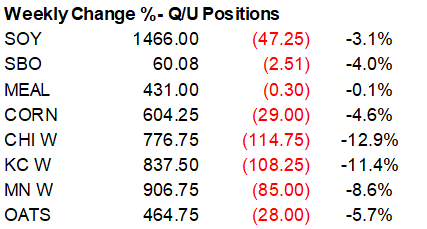

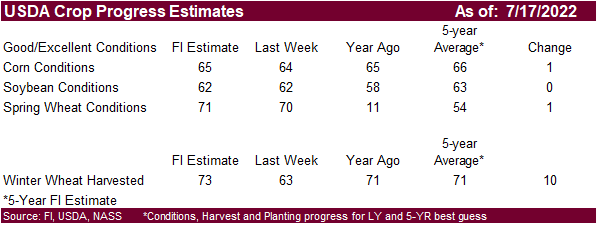
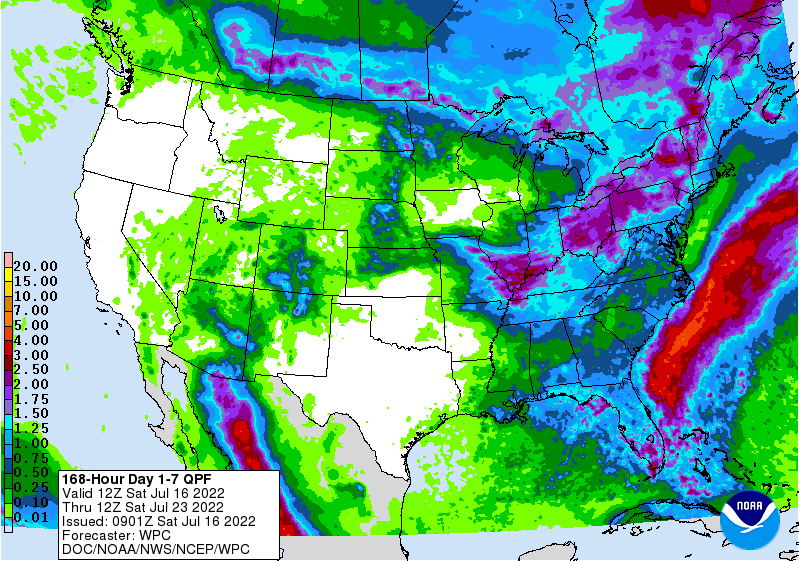
World
Weather Inc.
WEATHER
TO WATCH AROUND THE WORLD
-
No
significant theme changes were noted around the world overnight -
Much
of Europe continues drying out and this trend will last for the next ten days with temperatures hot in much of the west through the weekend and eventually spreading into central parts of the continent next week
-
Heat
and dryness will prevail through all next week, despite a few showers -
Extreme
highs in the 80s and 90s will be common across the continent this weekend into next week while western areas see some extremes of 96 to 108 degree readings across France and to 113 in Spain -
Germany
could eventually see a couple of extreme temperatures near 100 as well -
Crop
and livestock stress will threaten production for grains, oilseeds, milk, fruits and vegetables as well as result in lower animal weight gains -
Cooling
fuel demand will be quite strong -
Far
northeastern Europe will receive most of the significant rainfall in the continent over the next ten days -
Europe
weather Thursday was mostly dry and heating up in the west -
Rain
did fall from Czech Republic through southern Poland to northwestern Ukraine and part of Belarus with amounts to 0.68 inch -
All
other areas were dry -
Highest
temperatures were in the 90s to near 100 in central and southern France and southwestern Germany as well as northwestern Italy -
Spain
was hottest with widespread upper 90- and lower 100 degree readings and an extreme of 111 Fahrenheit in southern parts of the nation -
Highest
temperatures in northern France, southern U.K. and the remainder of Germany were in the upper 70s and 80s.
-
Russia’s
Southern Region will experience some periodic showers over the next ten days supporting “some” improvement for crop and field conditions after recent drying, but much more rain will be needed.
-
The
bulk of Russia’s Southern Region has low soil moisture and is experiencing some crop moisture stress -
Most
other areas in Russia, northern Ukraine, Belarus and the Baltic States will see rain routinely during the next couple of weeks resulting in moisture abundance -
U.S.
weather has not changed much overnight -
Net
drying occurred in most of the nation’s crop areas, although some showers occurred near the Gulf of Mexico coast -
Hot
and dry weather is expected from South Dakota to Texas as well as portions of the northern Delta, Missouri and southwestern Iowa -
High
temperatures will be in the 90s to 108 degrees Fahrenheit frequently in the next week to ten days from South Dakota to Texas and in the upper 80s and 90s from southern Minnesota through Missouri and the northern Delta -
A
few extremes near 100 will occur as far east as the Missouri River -
Rainfall
will be minimal in most of these areas, although some weekend rain is possible in a part of Missouri and Sunday into Monday for the northern Delta -
Crop
moisture and heat stress will be greatest in the Plains states, but there will also be some milder heat and dryness from southwestern Iowa and eastern Kansas through the northern Delta; including most of Missouri
-
Crop
stress will also present a threat to yields especially late season crops -
Cotton,
corn and sorghum in the southern Plains has already lost production potential and more losses are likely -
Timely
rainfall will impact other areas in the northern and eastern U.S. Midwest through the next ten days and that should help support favorable corn and soybean development -
A
few pockets of dryness will prevail and must be watched for possible expansion later in the summer -
Lower
U.S. Delta and southeastern states weather will be most favorable for crop development during the next two weeks -
U.S.
Pacific Northwest will be dry and very warm to hot at times over the next ten days -
No
precipitation fell Thursday and highest temperatures reached over 100 degrees in a part of the Snake River region -
Most
other afternoon temperatures were in the upper 80s and 90s Fahrenheit -
Stress
to crops and livestock has been widespread, and no relief is expected -
No
drought relief in most of the far western U.S. until late autumn at the earliest -
Canada’s
southern Prairies will experience net drying conditions during much of the coming week to ten days -
However,
a weather disturbance moving east out of southern Alberta Sunday into Monday will produce significant rain in a relatively narrow band relieving some of the dryness -
Rain
totals of 050 to 2.50 inches will be possible -
Parts
of Ontario, Canada need rain while Quebec crops continue to develop favorably with timely rainfall and warmer than usual temperatures
-
Drought
in northeastern Mexico and the southern U.S. Plains is unlikely to change in the next two weeks
-
Most
likely the only way drought will break in these areas will be from a tropical cyclone and none are expected for a while – at least not in that region.
-
Mexico
rain will be most abundant in the west and southern parts of the nation -
Argentina
rainfall will continue restricted during the next ten days except in east-central and northeastern parts of the nation where rain is expected periodically -
The
driest areas will be in central and southern Buenos Aires, La Pampa and southern Cordoba where little to no rain is expected for a while -
South
America temperatures over the next week will be near to below average in northern and eastern Argentina while above normal in central and northern crop areas of Brazil -
Brazil
rainfall will be minimal except in Atlantic coastal areas and from the southernmost parts of Mato Grosso do Sul and Parana into Rio Grande do Sul and Paraguay during the next ten days -
Some
of the advertised rain will be heavy from Uruguay into Rio Grande do Sul where 1.00 to 3.00 inches and local totals over 4.00 inches are expected
-
Good
drying conditions are likely elsewhere supporting Safrinha crop maturation and harvest progress -
India’s
monsoon will continue to perform aggressively over the next two weeks with widespread rain of significance expected along the west coast and from Odisha and northeastern Andhra Pradesh to Maharashtra, Madhya Pradesh, Gujarat and Rajasthan -
Only
far southern and some east-central India locations will receive lighter than usual precipitation -
Uttar
Pradesh, Jharkhand and Bihar have been driest recently and need significant rain -
Uttar
Pradesh should get rain in the second half of next week -
Summer
crop development will advance well, although flooding has been a problem for a few central production areas and replanting may be necessary -
China
rainfall is expected to be periodic and often abundant in east-central and some northeastern crop areas while the interior southeast is drier biased -
Excessive
rain events should not occur as often as they have been, but the nation will continue very wet and would benefit from some drying -
Recent
drier and warmer weather in east-central China has helped to improve crop and soil conditions -
Parts
of China need sunnier weather to induce better drying conditions after recent excessive rainfall. Crop damage has occurred in various areas in recent weeks because of too much moisture and serious flooding. -
China’s
Xinjiang province continues to experience relatively good weather -
A
few showers and thunderstorms are expected, but most of the region will be dry with temperatures varying greatly over the week to ten days -
Sumatra,
Indonesia will continue receiving lighter than usual rainfall over the coming week, although there will be sufficient amounts to support most crop needs -
Greater
rain is expected in the July 21-27 period -
All
other Southeast Asian nations will experience an abundance of rainfall during the next few weeks resulting in some flooding
-
Southern
Australia will get periodic rainfall southern wheat, barley and canola production areas through the next ten days -
Winter
crops are establishing well -
South
Australia needs greater and more frequent rain -
South
Korea rice areas are still dealing with a serious drought, despite some rain that fell recently.
-
Some
rain is expected over the next couple of weeks and it should gradually be enough to ease dryness and crop stress -
East-central
Africa rainfall will be greatest in central and western Ethiopia and lightest in parts of Uganda.
-
Tanzania
is normal dry at this time of year and it should be that way for the next few of weeks -
Some
areas in Kenya are expected to trend wetter in the next ten days -
West-central
Africa rainfall has been and will continue sufficient to support coffee, cocoa, sugarcane, rice and cotton development normally -
Some
greater rain would still be welcome in the drier areas of Ivory Coast -
Cotton
areas are expecting much greater rainfall in the next couple of weeks -
South
Africa’s crop moisture situation is favorable for winter crop emergence, although some additional rain might be welcome -
Restricted
rainfall is expected for a while -
Central
America rainfall will continue to be abundant to excessive and drying is needed -
Rain
in the Greater Antilles will occur periodically, but no excessive amounts are likely -
Today’s
Southern Oscillation Index was +14.11 and it will move erratically lower during the coming week -
New
Zealand weather is expected to be well mixed over the next ten days -
Temperatures
are expected to be a little milder than usual -
Rain
will be heavy in this first week of the outlook in western portions of South Island and below average elsewhere -
Late
July rainfall will increase again in North Island and northern portions of South island
Source:
World Weather INC
Monday,
July 18:
- USDA
export inspections – corn, soybeans, wheat, 11am - US
crop conditions for spring and winter wheat, corn, soybeans and cotton, 4pm - China’s
second batch of June trade data, including corn, pork and wheat imports - HOLIDAY:
Japan
Tuesday,
July 19:
- EU
weekly grain, oilseed import and export data - New
Zealand global dairy trade auction
Wednesday,
July 20:
- EIA
weekly U.S. ethanol inventories, production, 10:30am - China’s
third batch of June trade data, including soy, corn and pork imports by country - Malaysia’s
July 1-20 palm oil export data
Thursday,
July 21:
- International
Grains Council releases monthly report - USDA
weekly net-export sales for corn, soybeans, wheat, cotton, pork and beef, 8:30am - USDA
total milk and red meat production, 3pm
Friday,
July 22:
- ICE
Futures Europe weekly commitments of traders report - CFTC
commitments of traders weekly report on positions for various U.S. futures and options, 3:30pm - FranceAgriMer
weekly update on crop conditions - US
cattle inventory; cold storage data for beef, pork and poultry, 3pm
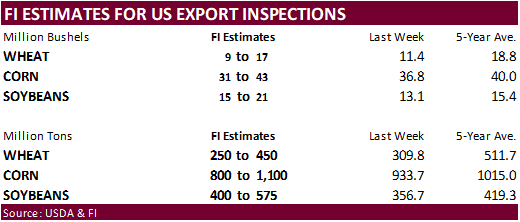
CFTC
Commitment of Traders
The
funds sold more than expected corn and soybeans than expected. The Chicago wheat position was near flat and now thought to be net short 6,400 contracts, futures only, as of Friday. The report is seen neutral for prices.






Reuters
Table
SUPPLEMENTAL
Non-Comm Indexes Comm
Net Chg Net Chg Net Chg
Corn
66,874 -6,575 391,553 -14,046 -407,081 13,767
Soybeans
30,653 -2,911 156,331 -13,852 -154,078 11,536
Soyoil
450 -5,855 92,017 -4,614 -95,629 11,686
CBOT
wheat -48,176 -739 121,520 -7,919 -64,462 9,063
KCBT
wheat -5,518 -2,537 49,713 -3,050 -41,488 5,079
FUTURES
+ OPTS Managed Swaps Producer
Net Chg Net Chg Net Chg
Corn
151,174 -21,693 262,817 -7,152 -411,514 17,200
Soybeans
95,711 -9,337 100,057 -4,999 -157,180 11,147
Soymeal
68,290 2,513 80,735 -1,393 -189,924 -5,648
Soyoil
18,877 -6,052 76,951 -3,222 -105,576 11,228
CBOT
wheat -6,444 -6,402 62,319 821 -51,080 7,658
KCBT
wheat 16,387 -5,650 26,161 383 -35,360 4,167
MGEX
wheat 2,654 -2,477 1,233 568 -5,324 1,110
———- ———- ———- ———- ———- ———-
Total
wheat 12,597 -14,529 89,713 1,772 -91,764 12,935
Live
cattle 18,080 3,782 59,636 -1,654 -95,402 -3,492
Feeder
cattle -5,809 1,722 3,401 -244 5,895 -652
Lean
hogs 39,934 11,450 49,694 -2,851 -77,775 -8,746
Other
NonReport Open
Net Chg Net Chg Interest Chg
Corn
48,869 4,791 -51,346 6,854 1,906,814 52,306
Soybeans
-5,683 -2,038 -32,907 5,226 790,441 -15,400
Soymeal
19,213 1,520 21,686 3,009 440,090 5,054
Soyoil
6,586 -738 3,163 -1,217 427,432 13,408
CBOT
wheat 4,087 -1,674 -8,883 -404 398,172 11,096
KCBT
wheat -4,482 592 -2,706 508 172,630 1,792
MGEX
wheat 2,678 521 -1,241 277 63,187 -2,511
———- ———- ———- ———- ———- ———-
Total
wheat 2,283 -561 -12,830 381 633,989 10,377
Live
cattle 20,279 633 -2,592 732 330,868 -10,617
Feeder
cattle 608 -560 -4,096 -266 52,496 -1,845
Lean
hogs -809 271 -11,045 -124 256,385 4,840
Macros
US
Univ. Of Michigan Sentiment Jul P: 51.1 (est 50.0; prev 50.0)
–
Current Conditions: 57.1 (est 53.7; prev 53.8)
–
Expectations: 47.3 (est 47.0; prev 47.5)
–
1-Year Inflation: 5.2% (est 5.3%; prev 5.3%)
–
5-10 Year Inflation: 2.8% (est 3.0%; prev 3.1%)
US
Capacity Utilization (M/M) Jun: 80.0% (est 80.8%; prevR 80.3%)
US
Manufacturing (SIC) Production (M/M) Jun: -0.5% (est -0.1%; prevR -0.5%)
Labor
Forecast Predicts 9.6% Increase In Demand For Temporary Workers For Q3 2022
95
Counterparties Take $2.154 Tln At Fed Reverse Repo Op (prev $2.207 Tln, 97 Bids)
Corn
·
CBOT corn
ended mostly higher on Friday in large part to US weather concerns, but gains were trimmed from lower Chicago and KC wheat.
·
Funds were net even in corn.
·
Overall fundamentals have not changed.
·
Hot and dry US weather expected next week could limit downside risk in corn.
·
EXPORT SALE RETRACTION (FAS-ESR-068-22) The daily export sale announced by FAS this morning is withdrawn based on updated information received from the exporter. FAS-ESR-068-22 had reported the sale of 133,000 metric tons of
corn for delivery to China during the 2022/2023 marketing year.
September
corn is seen in a $5.50 and $7.50 range
December
corn is seen in a wide $5.00-$8.00 range
·
The US soybean complex was mixed. Soybeans ended 5.75 cents lower for August, September was down 0.25 and November up 1.25 cents.
·
Funds were even in soybeans, sold 5,000 meal and bought 6,000 soybeans oil.
·
Brazil’s 2022-23 was estimated to increase 2.6% to a record, and production could end up at 151.5 million tons, also a record, according to Safras & Mercado. The growth in soybean area is expected to slow over the long term if
producers plant more corn amid potential exports to China.
·
China soybean reserve sales of imported soybeans were small again, a signal soybean procurements might be slow for the short term.
·
Ridging across the US is expected to restrict rain through June 28, but some rain is in the forecast for next week.
·
Indonesia on Saturday announced they will remove all palm export levies until August 31 and set the max palm oil export tax of $240/ton from September 1 when the reference price is above $1,500 per ton.
Earlier
this week we heard some palm oil in storage tanks were degrading in quality. End of May Indonesia palm stocks increased 18.5% from the previous month to 7.23 million tons.
·
Indonesia exported only 678,000 tons of palm oil in May, down 77 percent from May 2021. But during this period, the export ban was in place to May 23 (started April 28).
·
ITS: Malaysian 1-15 July palm oil exports were 518,520 tons, down 13.7 percent from same period month ago. AmSpec reported a 5.6 percent decrease to 499,964 tons.
·
Malaysia September palm was down 14 percent
for the week.
NOPA
was released early Friday morning and crush came in near trade expectations. Soybean oil stocks were 63 million pounds above trade expectations at 1.767 billion pounds (we were at 1.740 billion). We are thinking of shaving 50 million pounds off 2021-22 US
soybean oil demand, most for biofuel feedstock.

Export
Developments
·
USDA seeks 2,230 tons of vegetable oils for export on July 17 for Aug 16-Sep 15 shipment.
·
China sold less than 15,000 ton of soybeans out of reserves Friday, from little more than 500,000 tons offered.
·
China looks to sell a half a million tons of soybeans out of reserves on July 22.
December
oil share rebounded
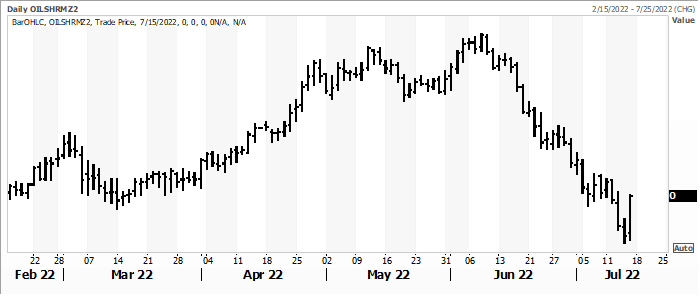
Source:
Reuters and FI
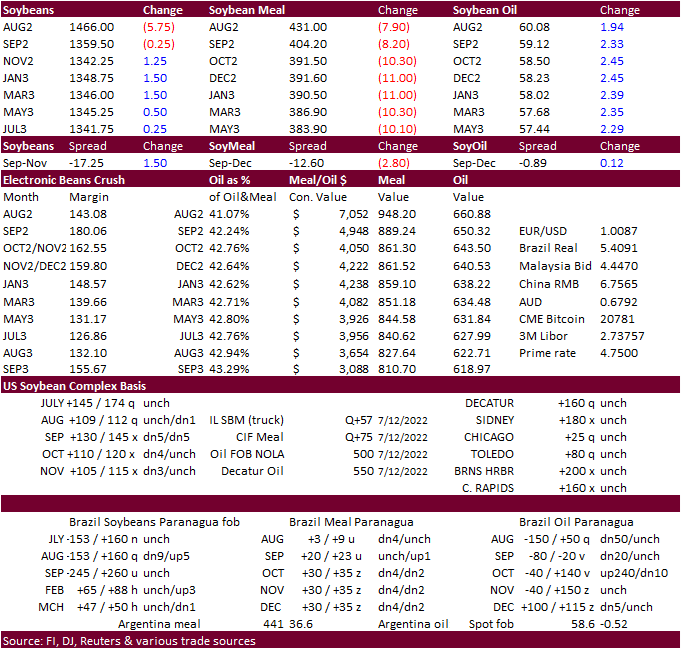
Updated
7/14/22
Soybeans
– August $13.90-$16.00
Soybeans
– November is seen in a wide $12.75-$16.50 range
Soybean
meal – August $400-$485
Soybean
oil – August 56.00-62.00
·
US wheat futures ended mostly lower (MN mixed) on follow through selling as US spring wheat areas received rain and Canadian Prairie crop conditions stabilized. France soft wheat harvest pressure added to the negative undertone.
Argentina crop prospects are deteriorating though. The five major global suppliers of exportable wheat is still expected to end up at multi year lows, for stocks to use, by the end of the crop season.
·
Chicago wheat is priced at pre-war levels. For the week Chicago was down 114.75 cents, a 12.9% decline.
·
We revised our September and December price ranges (below).
·
Funds sold an estimated net 7,000 Chicago wheat contracts.
·
France collected 50 percent of this year’s soft wheat crop through July 11, up from 14 percent week earlier and compares to 3 percent year ago. 64% of soft wheat was in good or excellent condition, up from 63% the previous week
but down from 76% last year, according to FranceAgriMer.
·
Paris wheat was down 16 euros at 325.50, near its contract low.
·
Buenos Aires Grains Exchange estimated the Argentina wheat crop at 17.7 million tons, down from previous 18.5 million tons. It mirrors another slash this week to the crop. Argentina’s Rosario Grains Exchange lowered their wheat
production estimate to 17.7 million tons from previous 18.5 million. The expected area shrank due to dryness.
·
Russia issued proposals to help Ukraine Black Sea exports and apparently, they are supported by negotiators. A deal might be reached next week. Ukraine looks forward to signing a deal, according to a senior Ukraine official
talking with Reuters.
·
Meanwhile, Russia has increased military operations in Ukraine. Missiles hit the northeastern town of Chuhuiv in Kharkiv region.
·
Asian wheat importers were searching around for Black Sea and EU wheat cargoes late in the week, perhaps after the decline in prices.
US
Wheat Associates
“The
HRW harvest is 43% complete in sampled states with 300 samples in the lab for testing. The SRW harvest is winding down and currently grades U.S. #1 SRW. Conditions for the PNW SW crop remain very good and test cutting has begun in the drier areas of Oregon
and Washington. The HRS and Northern durum crops are advancing steadily in good condition.”

·
The Philippines bought 40,000 tons of feed wheat for October 10 through November 10 shipment.
·
Another group in the Philippines bought 110,000 tons of feed wheat, at $376.50 c&f for Q4 shipment.
·
Pakistan seeks 300,000 tons of wheat, set to close July 18 for Aug 1-25 shipment.
·
Jordan seeks 120,000 tons of wheat on July 19 for possible shipment sometime in November and/or December.
Rice/Other
·
None reported
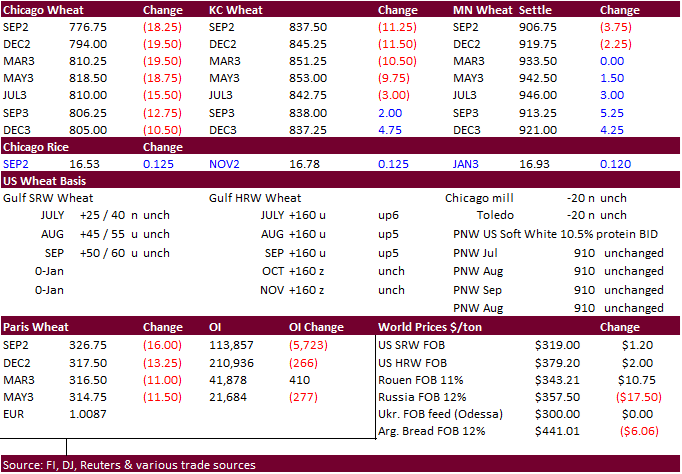
Updated
7/16/22
Chicago
– September $7.50 to $9.00 range, December $7.00-$11.00
KC
– September $7.85 to $10.25 range, December $8.00-$12.00
MN
– September $8.50‐$11.00, December $8.00-$12.50
Terry Reilly
Senior Commodity Analyst – Grain and Oilseeds
Futures International
One Lincoln Center
18 W 140 Butterfield Rd.
Oakbrook Terrace, Il. 60181
W: 312.604.1366
ICE IM:
treilly1
Skype: fi.treilly

Trading of futures, options, swaps and other derivatives is risky and is not suitable for all persons. All of these investment products are leveraged, and you can lose more than your initial deposit. Each investment product is offered
only to and from jurisdictions where solicitation and sale are lawful, and in accordance with applicable laws and regulations in such jurisdiction. The information provided here should not be relied upon as a substitute for independent research before making
your investment decisions. Futures International, LLC is merely providing this information for your general information and the information does not take into account any particular individual’s investment objectives, financial situation, or needs. All investors
should obtain advice based on their unique situation before making any investment decision. The contents of this communication and any attachments are for informational purposes only and under no circumstances should they be construed as an offer to buy or
sell, or a solicitation to buy or sell any future, option, swap or other derivative. The sources for the information and any opinions in this communication are believed to be reliable, but Futures International, LLC does not warrant or guarantee the accuracy
of such information or opinions. Futures International, LLC and its principals and employees may take positions different from any positions described in this communication. Past results are not necessarily indicative of future results.

